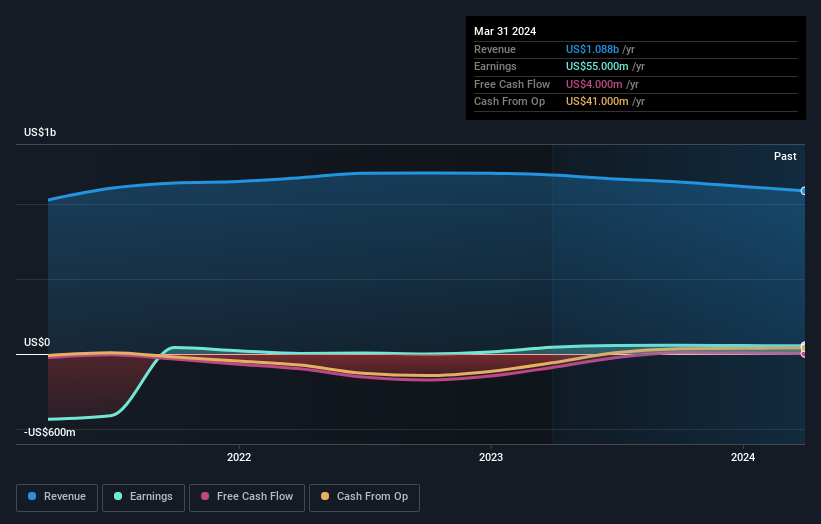Eastman Kodak Company (NYSE:KODK) is a favorite amongst institutional investors who own 52%
Key Insights
Given the large stake in the stock by institutions, Eastman Kodak's stock price might be vulnerable to their trading decisions
The top 14 shareholders own 51% of the company
Past performance of a company along with ownership data serve to give a strong idea about prospects for a business
If you want to know who really controls Eastman Kodak Company (NYSE:KODK), then you'll have to look at the makeup of its share registry. The group holding the most number of shares in the company, around 52% to be precise, is institutions. Put another way, the group faces the maximum upside potential (or downside risk).
Given the vast amount of money and research capacities at their disposal, institutional ownership tends to carry a lot of weight, especially with individual investors. Therefore, a good portion of institutional money invested in the company is usually a huge vote of confidence on its future.
Let's take a closer look to see what the different types of shareholders can tell us about Eastman Kodak.
View our latest analysis for Eastman Kodak
What Does The Institutional Ownership Tell Us About Eastman Kodak?
Many institutions measure their performance against an index that approximates the local market. So they usually pay more attention to companies that are included in major indices.
As you can see, institutional investors have a fair amount of stake in Eastman Kodak. This implies the analysts working for those institutions have looked at the stock and they like it. But just like anyone else, they could be wrong. It is not uncommon to see a big share price drop if two large institutional investors try to sell out of a stock at the same time. So it is worth checking the past earnings trajectory of Eastman Kodak, (below). Of course, keep in mind that there are other factors to consider, too.
Since institutional investors own more than half the issued stock, the board will likely have to pay attention to their preferences. Eastman Kodak is not owned by hedge funds. Our data shows that Southeastern Asset Management, Inc. is the largest shareholder with 12% of shares outstanding. With 5.6% and 5.3% of the shares outstanding respectively, George Karfunkel and BlackRock, Inc. are the second and third largest shareholders. Additionally, the company's CEO James Continenza directly holds 1.9% of the total shares outstanding.
Looking at the shareholder registry, we can see that 51% of the ownership is controlled by the top 14 shareholders, meaning that no single shareholder has a majority interest in the ownership.
Researching institutional ownership is a good way to gauge and filter a stock's expected performance. The same can be achieved by studying analyst sentiments. We're not picking up on any analyst coverage of the stock at the moment, so the company is unlikely to be widely held.
Insider Ownership Of Eastman Kodak
While the precise definition of an insider can be subjective, almost everyone considers board members to be insiders. Management ultimately answers to the board. However, it is not uncommon for managers to be executive board members, especially if they are a founder or the CEO.
Insider ownership is positive when it signals leadership are thinking like the true owners of the company. However, high insider ownership can also give immense power to a small group within the company. This can be negative in some circumstances.
We can report that insiders do own shares in Eastman Kodak Company. It has a market capitalization of just US$411m, and insiders have US$35m worth of shares, in their own names. It is good to see some investment by insiders, but it might be worth checking if those insiders have been buying.
General Public Ownership
With a 36% ownership, the general public, mostly comprising of individual investors, have some degree of sway over Eastman Kodak. This size of ownership, while considerable, may not be enough to change company policy if the decision is not in sync with other large shareholders.
Private Company Ownership
Our data indicates that Private Companies hold 3.3%, of the company's shares. It might be worth looking deeper into this. If related parties, such as insiders, have an interest in one of these private companies, that should be disclosed in the annual report. Private companies may also have a strategic interest in the company.
Next Steps:
While it is well worth considering the different groups that own a company, there are other factors that are even more important. Take risks for example - Eastman Kodak has 2 warning signs (and 1 which is significant) we think you should know about.
Of course this may not be the best stock to buy. So take a peek at this free free list of interesting companies.
NB: Figures in this article are calculated using data from the last twelve months, which refer to the 12-month period ending on the last date of the month the financial statement is dated. This may not be consistent with full year annual report figures.
Have feedback on this article? Concerned about the content? Get in touch with us directly. Alternatively, email editorial-team (at) simplywallst.com.
This article by Simply Wall St is general in nature. We provide commentary based on historical data and analyst forecasts only using an unbiased methodology and our articles are not intended to be financial advice. It does not constitute a recommendation to buy or sell any stock, and does not take account of your objectives, or your financial situation. We aim to bring you long-term focused analysis driven by fundamental data. Note that our analysis may not factor in the latest price-sensitive company announcements or qualitative material. Simply Wall St has no position in any stocks mentioned.

 Yahoo Finance
Yahoo Finance 

